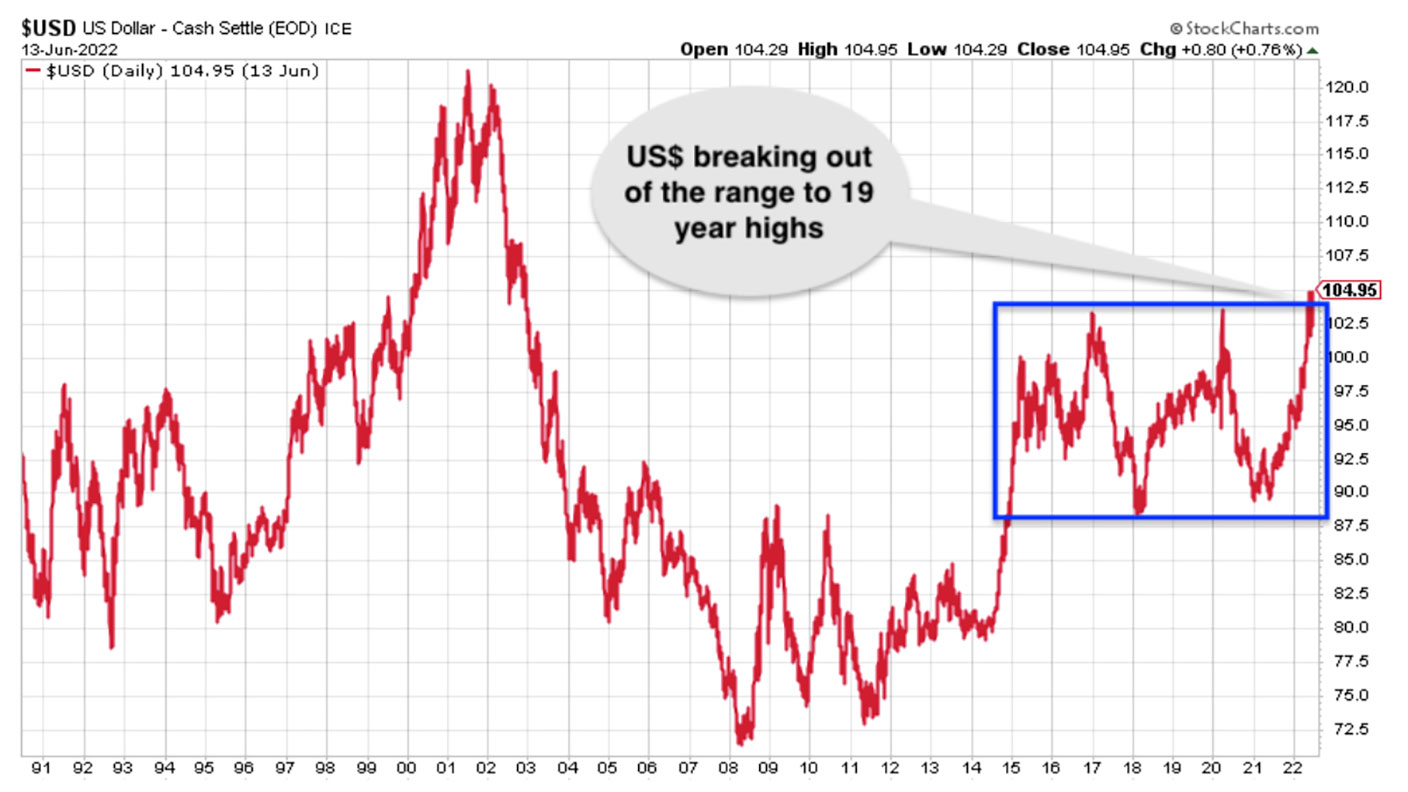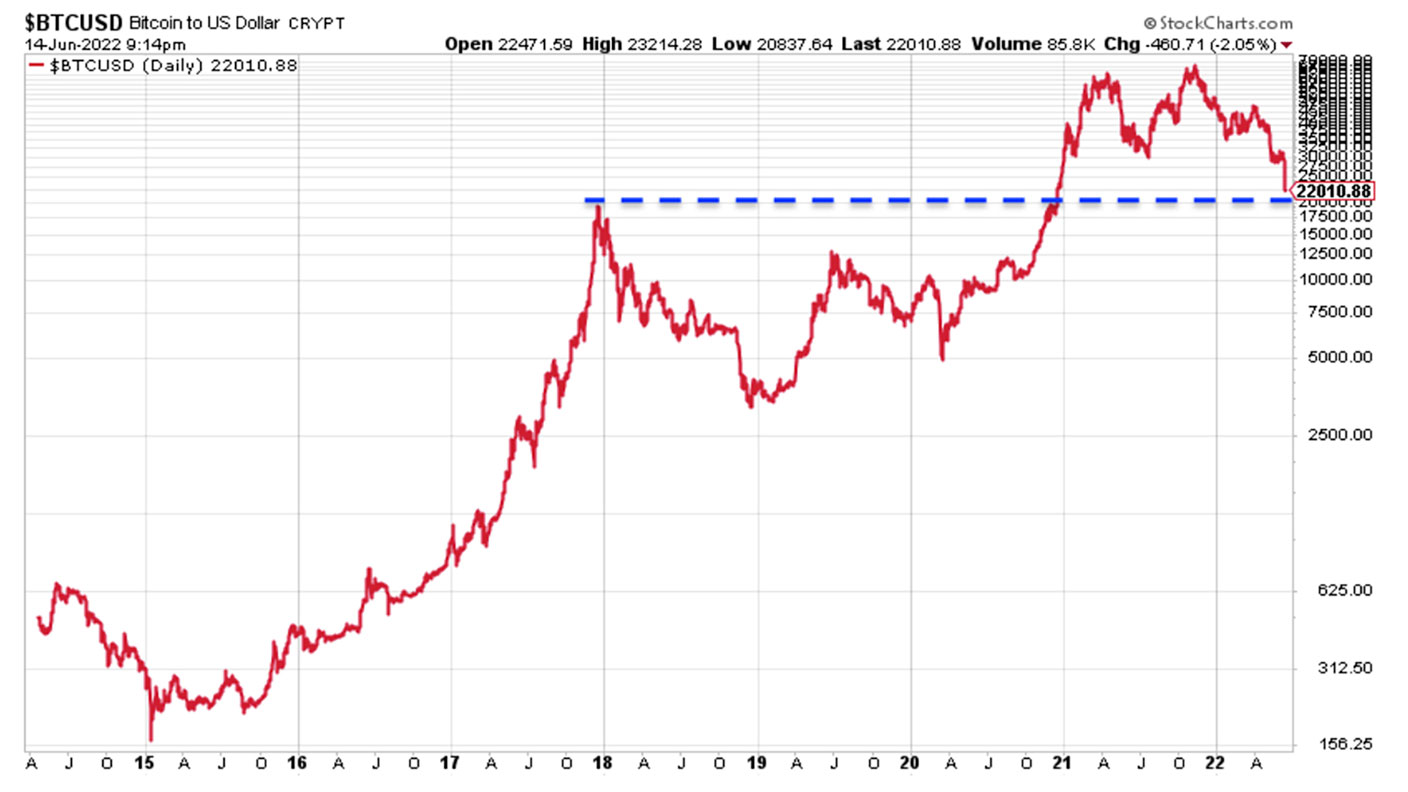How much further will bitcoin fall?
Bitcoin has crashed hard, along with the wider cryptocurrency sector. Everything is looking awful, says Dominic Frisby. Here, he asks just how low bitcoin could fall.


Get the latest financial news, insights and expert analysis from our award-winning MoneyWeek team, to help you understand what really matters when it comes to your finances.
You are now subscribed
Your newsletter sign-up was successful
Want to add more newsletters?

Twice daily
MoneyWeek
Get the latest financial news, insights and expert analysis from our award-winning MoneyWeek team, to help you understand what really matters when it comes to your finances.

Four times a week
Look After My Bills
Sign up to our free money-saving newsletter, filled with the latest news and expert advice to help you find the best tips and deals for managing your bills. Start saving today!
Like Brexit, Trump, what a woman is, the BBC or vaccines, bitcoin has proved itself one of the battlegrounds in the culture war.
Some people like it a lot. “Bitcoin fixes this” is the slogan, and bitcoin is thought to be the answer to any number of societal problems – from unaffordable housing to government overreach and the financial inclusion of the unbanked, the world’s poorest.
There are many, however, who take the other view: it’s only used by drug dealers and money-launderers, it’s a Ponzi scheme, it can’t scale and it’s destroying the environment.
MoneyWeek
Subscribe to MoneyWeek today and get your first six magazine issues absolutely FREE

Sign up to Money Morning
Don't miss the latest investment and personal finances news, market analysis, plus money-saving tips with our free twice-daily newsletter
Don't miss the latest investment and personal finances news, market analysis, plus money-saving tips with our free twice-daily newsletter
The latter have been rather noisy of late. The reason?
Bitcoin’s crashed. Again.
Bitcoin has had a painful crash – but this isn’t that unusual
Let’s start with the price. What was $67,500 back in November is now $21,000. It touched $20,000 on Monday. I make that a 70% haircut. Not good.
But not so abnormal either.
Bitcoin has had at least six corrections of 80% in its 13-year life – I make that one almost every two years. And yet, on broader time horizons, the network continues to grow, the number of users increases and the price appreciates.
That kind of volatility is hard to stomach (particularly if you have a large portion of your net worth tied up in it, or, worse, on leverage) and it makes it harder to press the case for bitcoin to become some kind of default money system.
But it is what it is: a new technology whose purpose is to be money. It’s about as speculative a boom-bust vehicle as you could ever hope to design.
As I see it, there have been two factors driving the price action.
First, we are in the midst of one of the most vicious bear markets in my memory. Just about every asset there is is being battered. (Will oil be the next to go? I am starting to wonder.)
We are talking about deleveraging across the board and, in such a macro environment, there is little time for speculative growth plays like bitcoin, the future of money or not. Panic is acute. There is a rush for cash.
Never mind that, after you account for inflation, it’s losing 10% per annum. For now cash is king – specifically the US dollar, which is breaking out of its range to 19-year highs.
I’m worried this goes to 120, by the way.

If it does (as we have been warning for some time), never mind bitcoin, all assets are in even deeper trouble, be they stocks, commodities or other national currencies. We might even need another Plaza Accord.
But of all the sectors to have been walloped by this bear market, tech, the darling of the preceding bull market, has been hit hardest. Bitcoin may not be a Nasdaq stock, but it trades as though it is, and the Nasdaq has been hit hard.
The wider cryptocurrency sector is in panic mode
The second catalyst to drive crypto prices lower comes from within the sector itself. We wrote a few weeks ago about the collapse of stablecoin luna and suggested bitcoin would go to $20,000 then with the sudden rush for liquidity. But it didn’t; it held up.
The latest scandal to dog crypto – which has a knock on from terra and luna – is around celsius. And that has driven it to $20,000.
Celsius is one of those lending platforms which paid what seemed like extraordinary rates of interest if you stake your crypto coins with them. They would then lend those coins out. Sort of like banking, really, but with cooler buzzwords. It paid 7% for bitcoin, I gather, and up to 18% for others.
If it sounds too good to be true, it probably isn’t true.
With falling crypto prices this year, many have been withdrawing their cryptocurrency, creating for celsius a liquidity crisis of its own. The collapse in value of its terra holdings has only made things worse, while it borrowed ether from customers and staked it in such a way that it is now tied up and can’t sell.
It’s a clusterflip. But it then emerged that it had sent over $300m in coins to exchange FTX. It looked like a rug pull. Cue a market panic, as everyone tried to get their coins back, and in many cases, sell what they have. Before long, Binance, the world’s biggest exchange, also halted withdrawals (only for a period though).
Reading this I imagine most neutrals would not want to get involved in this space at all. Well, fair enough.
I remain of the mind that bitcoin is an extraordinary technological breakthrough and I want to keep my shares in what is the most powerful computer network ever built. Others won’t feel the same way – and perspectives get messed with in bull and bear markets. We are at one of those points where everything looks awful.
How much further will bitcoin fall from here?
I’ve suggested before several times that bitcoin might come back to $20,000. That was its level in 2017 at the end of that particular episode (before it then went back to $3,000). It’s an obvious pivotal price point.
The next question to ask ourselves is: will $20,000 hold?
Well, if this bear market in everything carries on for much longer, the short answer is, “no”. Everything will be going lower.
Here’s a chart with a dashed line at the $20,000 mark.
Let’s hope what was resistance now becomes support. It often does.

If not, the next line in the sand is $12,000.
A speculator might look at that and think, I’ll buy bitcoin at $21,000, with a stop at $18k or $19k. Pretty good odds?
But such chutzpah is hard to find in a bear market after a decline like this. As is the necessary cash.
Dominic’s film, Adam Smith: Father of the Fringe, about the unlikely influence of the father of economics on the greatest arts festival in the world is now available to watch on YouTube.
Get the latest financial news, insights and expert analysis from our award-winning MoneyWeek team, to help you understand what really matters when it comes to your finances.

-
 Should you buy an active ETF?
Should you buy an active ETF?ETFs are often mischaracterised as passive products, but they can be a convenient way to add active management to your portfolio
-
 Power up your pension before 5 April – easy ways to save before the tax year end
Power up your pension before 5 April – easy ways to save before the tax year endWith the end of the tax year looming, pension savers currently have a window to review and maximise what’s going into their retirement funds – we look at how
-
 Halifax: House price slump continues as prices slide for the sixth consecutive month
Halifax: House price slump continues as prices slide for the sixth consecutive monthUK house prices fell again in September as buyers returned, but the slowdown was not as fast as anticipated, latest Halifax data shows. Where are house prices falling the most?
-
 Rents hit a record high - but is the opportunity for buy-to-let investors still strong?
Rents hit a record high - but is the opportunity for buy-to-let investors still strong?UK rent prices have hit a record high with the average hitting over £1,200 a month says Rightmove. Are there still opportunities in buy-to-let?
-
 Pension savers turn to gold investments
Pension savers turn to gold investmentsInvestors are racing to buy gold to protect their pensions from a stock market correction and high inflation, experts say
-
 Where to find the best returns from student accommodation
Where to find the best returns from student accommodationStudent accommodation can be a lucrative investment if you know where to look.
-
 The world’s best bargain stocks
The world’s best bargain stocksSearching for bargain stocks with Alec Cutler of the Orbis Global Balanced Fund, who tells Andrew Van Sickle which sectors are being overlooked.
-
 Revealed: the cheapest cities to own a home in Britain
Revealed: the cheapest cities to own a home in BritainNew research reveals the cheapest cities to own a home, taking account of mortgage payments, utility bills and council tax
-
 UK recession: How to protect your portfolio
UK recession: How to protect your portfolioAs the UK recession is confirmed, we look at ways to protect your wealth.
-
 Buy-to-let returns fall 59% amid higher mortgage rates
Buy-to-let returns fall 59% amid higher mortgage ratesBuy-to-let returns are slumping as the cost of borrowing spirals.